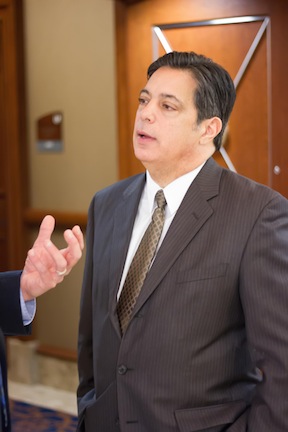Court hearing on judge retirement ballot question raises practical and constitutional issues
Sen. Jay Costa: ‘If you want to change the language (of the ballot question) you need to go back and start all over again. When the five years expires, go through that process again.’
With only a week to go before the primary election, Pennsylvania judges and their political partners in the legislature are still monkeying with a proposed ballot question to give these same state judges five more years on the bench, until age 75.
Last week the Republican majorities in the state legislature passed a concurrent resolution directing Secretary of the Commonwealth Pedro Cortes to rewrite the wording of the ballot question for the proposed constitutional amendment so that it wouldn’t mention that judges currently must retire at age 70.
The scandal-prone judiciary obviously hopes that this deception will make the measure easier to pass at the polls.
In their resolution, the Republican majorities also directed Secretary Cortes to remove the question from the April 26 primary ballot, and move it to the general election in November.
For some reason they imagine this undeserved constitutional change and pay grab would stand a better chance with voters in November. Or maybe they’re simply kicking the can down the road.
They also demanded that “the secretary not make a tally of the votes cast,” and “disregard” any votes on absentee ballots cast in next week’s primary election, thus disenfranchising any who vote against the controversial proposal in next week’s election.
If all that’s not monkeying with the vote, and scandalous, what is?
All this last minute jockeying and monkey business with the ballot question has raised both practical and constitutional issues.
In response, three Democratic state senators — Minority Leader Jay Costa, Daylin Leach, and Christine Tartaglione — late last week filed suit in Commonwealth Court for an injunction to stop the proposed changes and to leave the ballot question for next Tuesday’s vote alone.
To its credit, the Wolf administration has decided to change nothing unless directed by a judge (who after all will be affected by the decision), pending outcome of the senate lawsuit.
“The Department of State is waiting for the outcome of the hearing,” the department’s deputy press secretary, Kaitlin Murphy, tells me. “With the election just around the corner, counties cannot remove the question from the paper or electronic ballot at this point. As of Thursday 90,000 absentee voter ballots that had been sent out, (and) 20,000 had already been received with that question answered. And counties start setting up their voting machines tomorrow (April 19). The machines have all been certified and tested.
“If the decision at the hearing is to throw out the question, each county will post a sign at each polling place to notify voters that the question will not be counted.”
At a hearing before Commonwealth Court Judge P. Kevin Brobson this Tuesday, April 19, the practical problems of the GOP resolution were discussed at length by witnesses.
Two election officials testified it wasn’t practical or safe to change the ballot question on the state’s 25,000 voting machines in some 9,100 polling places only several days before the election.
They also said it was against their statutory obligation as election officials to “disregard” votes already cast, including the tens of thousands of completed absentee and military ballots now waiting to be counted, as the GOP resolution demands.
Lisa Deeley, the election commission for Philadelphia, said, “it is not practical” to change the printed ballots on the city’s 3,517 voting machines days out from the election. As well, she testified, some 2,500 completed absentee ballots had already been returned to Philadelphia County.
“You’re under a duty to canvas (i.e. count) them, aren’t you?” she was asked.
“Yes,” she replied.
Jonathan Marks, of the State Department’s bureau of election, explained that today’s computerized voting machines can’t quickly or safely be changed as easily as old-fashioned, lever voting machines.
In the old days one could simply replace a card in the voting booth, he explained. With computerized voting machines, he said, election officials must change computer code, and then tediously test the results. If that process is done hurriedly, he explained, there’s a risk the voting results could be corrupted.
Marks pointed out that next week’s primary included two presidential elections, and that the entire nation would be watching, and relying on accurate results.
It wasn’t a good idea to monkey with the ballot at this late date, as the GOP was demanding, he testified.
He seemed to be asking Judge Brobson to read between the lines: how much trouble and scandal are judges willing to risk for this onerous scheme?
The many practical problems aside, Sen. Jay Costa, the senate Democratic minority leader, says there are grave constitutional and procedural problems with the concurrent resolution passed by the GOP that demands these last-minute changes.
The GOP is attempting an end around of the governor and the executive branch, Costa explains.
A concurrent resolution differs from a joint resolution in that it does not have to be signed by the governor. A concurrent resolution usually involves matters of internal affairs to the legislature, not requiring the governor’s pen, like proclamations, or who gets to use the good washrooms.
That legislative leaders went around the governor with a concurrent resolution to direct the executive’s department head — the secretary of state — is a constitutional problem, Costa says.
“I’m very concerned that some 33,000 individuals who’ve already cast their votes and that their votes would be disregarded,” Costa told me at recess during the four-hour court hearing. “I think that’s a problem. That’s an issue. I’m very concerned about the process by which they want to undertake that by masking or hiding the question on the ballot. That’s a problem for me.
“More importantly, for us, as a senate leader, the process that was utilized (is as much of a problem). I mean, this concurrent resolution process really allows the legislature to direct the executive branch what they can and cannot do, or should or should not do. The legislature can direct the executive branch to do certain things, without that having to go through the governor’s desk. And to me that’s greatly important.
“They’re trying to achieve what should be done through a joint resolution through a concurrent resolution. So it sets up a horrible precedent for Pennsylvania going forward. A horrible constitutional precedent.
“I’m very concerned about the horrible precedent this sets, with respect to the legislature, two chambers of a general assembly, majority chambers, could pass a concurrent resolution directing an executive secretary to do x, y and z. And it does not go through the governor’s desk.
“Theoretically what can happen in two years they can come back with another concurrent resolution, both chambers pass it, and tell the secretary of state, tell the election department, that they need to ask for voter ID. And it doesn’t go through the governor’s desk (for his signature). It goes right to the secretary. If I let this go he has to comply with that. He has no choice. And that’s what I’m trying to prevent.
“Those type of things have to go across the governor’s desk, in my opinion, just as the constitution requires. And just as the way the framers wanted it to be done.”
“In election law more than any other area of law we have to guard against partisan overreach and misconduct,” Sen. Daylin Leach tells me. “This is a situation where they are taking power away from the executive in order to get the result of an election that they want to see. But they’re doing it in an illegal way, and they’re disenfranchising voters. And the courts should be very vigilant against allowing that sort of mischief.”
Are the judges and the GOP attempting chicanery at the polls? I asked Sen. Leach.
“Chicanery? I’m not even sure of the precise definition of that,” he says. “It does seem like it is attempting to manipulate the system to gain partisan advantage. And the courts should not allow us to do that. Elections should be the one area where we really have a firewall against partisanship. That’s the whole basis of our system. If we don’t have a fair election process — one that follows the law — we’re in a lot of trouble.”
Isn’t this confusing to voters? I asked.
“Of course,” Sen. Leach replied. Voters have seen “$2.6 million worth of advertising about this election. Lots of news coverage about this election in terms of the judges. And suddenly they’re going in ready to vote on that, and they’re not going to be allowed to vote if this is sustained. Or they’ve already voted on it and their votes aren’t going to be counted, which is really going to confuse voters.
“The whole point of this is, it’s not (just) changing the date; it’s changing the language. It’s just too late to change the language. But really that’s the point, is to change the language. So people don’t really understand what they’re doing. That’s unfortunate,” Sen. Leach says.
According to the state constitution, the remedy for the judges, if they lose the vote next Tuesday, is to try again to pass a constitutional amendment in another five years.
“That’s exactly right,” Sen. Costa says. “If you want to change the language (of the ballot question), which is what they are doing, they’re changing the language … you need to go back and start all over again. When the five years expires, go through that process again. Exactly right.”
Update: On Wednesday, April 20, Commonwealth Court Judge Kevin Brobson ordered the Wolf Administration not to count the votes received in the primary election on April 26, and to relist the question on the November ballot. Senate Democrats say they will likely appeal to the state Supreme Court.



